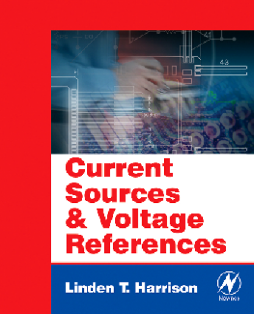
Additional Information
Book Details
Abstract
Current Sources and Voltage References provides fixed, well-regulated levels of current or voltage within a circuit. These are two of the most important “building blocks “ of analog circuits, and are typically used in creating most analog IC designs.
Part 1 shows the reader how current sources are created, how they can be optimized, and how they can be utilized by the OEM circuit designer. The book serves as a “must-have reference for the successful development of precision circuit applications. It shows practical examples using either BJTs, FETs, precision op amps, or even matched CMOS arrays being used to create highly accurate current source designs, ranging from nanoAmps to Amps. In each chapter the most important characteristics of the particular semiconductor type being studied are carefully reviewed. This not only serves as a helpful refresher for experienced engineers, but also as a good foundation for all EE student coursework, and includes device models and relevant equations.
Part 2 focuses on semiconductor voltage references, from their design to their various practical enhancements. It ranges from the simple Zener diode to today’s most advanced topologies, including Analog Devices’ XFET® and Intersil’s FGA™ (invented while this book was being written). Over 300 applications and circuit diagrams are shown throughout this easy-to-read, practical reference book.
* Discusses how to design low-noise, precision current sources using matched transistor pairs.
* Explains the design of high power current sources with power MOSFETs
* Gives proven techniques to reduce drift and improve accuracy in voltage references.
“Even if you are more likely to buy than build your own, this book explains what you need to look for.
— EDN, September 2005
“... You’ll benefit from reading Linden T. Harrison’s book. I've never seen a book devoted to these workhorse and often overlooked circuits.
— Test & Measurement World, October 1, 2005
